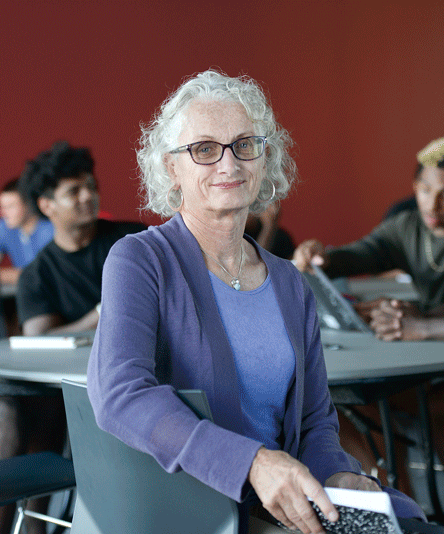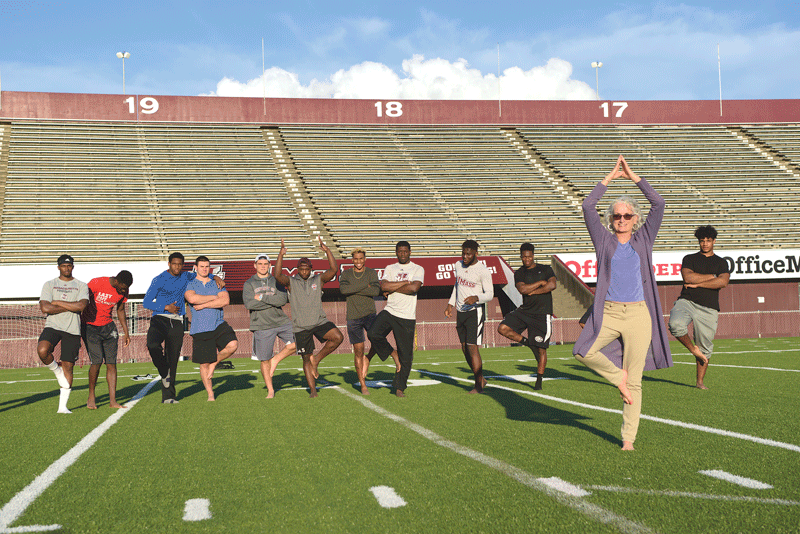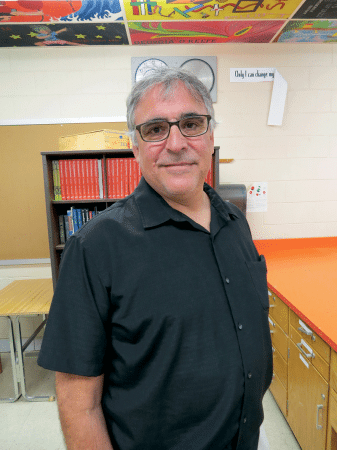Innovation in Health/Wellness: Genevieve Chandler
Nursing Professor Helps Young People Build Resiliency

Genevieve Chandler
Dani Fine Photography
James Bowe Jr. had a few full-scholarship offers come his way during his senior year of high school in Miami, Fla.
But at 180 pounds, most of the elite football programs considered him too small to excel at his position — outside linebacker.
He chose to accept an offer from a school that he said stuck by him when others didn’t — UMass Amherst — but was soon to discover that being undersized was only one of many stress-inducing challenges he would encounter on and off the practice fields outside McGuirk Alumni Stadium after arriving in 2015.
“The biggest change for me coming out of high school was the speed of the game and how much you had to learn — we had to develop quickly, because there’s a lot of different plays and a lot of terminology you have to learn,” he said. “And along with my practice schedule, I had my classes and everything else; it was a lot for me to handle, and that affected me in the classroom.”
And there was still more that he needed to cope with, whether he knew it or not.
Indeed, as he would discover, the death of his sister not long before he arrived at UMass had left scars that hadn’t fully healed — there were feelings he needed to get off his chest and emotions that he had to confront.
And confront them he did, while also putting a huge dent in his stress level, thanks in large part to a unique program blueprinted by Genevieve Chandler, associate professor of Nursing at UMass Amherst. It’s called Changing Minds Changing Lives (CMCL), and it was created and piloted by Chandler on the basic premise that resiliency is something that can and should be taught, developed, and built.
“It’s long been thought that people were resilient or they were not resilient,” said Chandler, who so impressed the judges with her work on this subject to date that she became one of two winners in the category of Innovation in Healthcare. “But researchers concluded that everyone has resilience; the question is how much and what we can do about it. Researchers realized that we not only carried something inside, but we needed access to resources outside to build that resilience.”
Elaborating, Chandler said much of her career’s work has been in the realm of creating such resources, especially as they relate to adverse childhood experiences, or ACEs, as they’re called.
It’s not about what you don’t know, it’s about what you do know, and that makes it different from most classes. It’s not about deficits, it’s about strengths. I can’t teach you about you; you’re going to have to teach me about you.”
These include physical abuse, sexual abuse, emotional abuse, and the broad category of household dysfunction, which includes everything from substance abuse to incarceration; from domestic violence to divorce or death of a loved one.
That’s a long list, and a host of studies have concluded that perhaps 60% of the population has an ACE, or several, in their background, said Chandler, adding that studies have also shown direct links between these experiences and physical and mental illness.
Her work, and especially the CMCL initiative, is aimed not only at focusing attention on ACEs and their impact, but also at helping individuals move past these ACEs by teaching them resiliency.
How? Through a broad course of study that includes everything from deep-breathing exercises and yoga to group writing (lots of that, as we’ll see later) and storytelling.
These elements and this mindset came together in the pilot program, what Chandler called a “strengths” class offered at the university, one that attracted a broad mix of students, and, later, an expansion of the initiative to include those involved with Holyoke Community College’s Gateway Program for students who had dropped out of high school.
These successes caught the attention of Jim Helling, athletic counselor for the university, which led to a program involving incoming football players, all of whom, like Bowe, were dealing with a host of challenges and experiencing high levels of stress.
And Bowe is just one of many who can testify that CMCL has certainly helped in that regard.
“This class helped me get adapted to college, and taught me a lot of different ways to handle stress; it taught me to just breathe,” he said, saying that last word slowly for special emphasis. “We were taught to breathe and calm down during stressful situations. That next semester, after I took this class, I was able to get my GPA back to where I needed it to be.”
Breathing is just one of the lessons Bowe and teammate Martin Mangram, a safety from Buford, Ga., imparted upon a group of Springfield Central High School football players they mentored as they took essentially the same class offered to the incoming players at UMass in the latest, and apparently successful, expansion of the CMCL initiative.

Genevieve Chandler, seen here with incoming UMass football players, says resiliency is something that can be taught or developed.
“We feel it was very successful,” Tad Tokarz, the school’s principal, said of the study, which involved a handful of players. “And speaking to students, they would tell you they’ve grown, and they can tell you how they’ve improved in recognizing emotions and building resilience.”
Course of Action
Helling, a psychiatric social worker as well as athletic counselor at UMass Amherst, was one of those offering instruction and insight to those football players at Springfield Central this summer.
And he said he started one of his presentations by putting up a picture of Charles Darwin on the screen at the front of the room and then focusing the conversation on the naturalist’s theory of ‘survival of the fittest’ — and in a way that hits at the heart of the CMCL initiative.
“The fittest does not mean the physically strongest,” Helling told BusinessWest. “The fittest means the best fit; it’s not the strongest or the biggest or the smartest that survives. The ones who survive are the ones who fit in best in their environment and meet the challenges that their environment presents to them.”
Helping young individuals become far more fit — in this respect — has become the focus of Chandler’s research, and life, in recent years. And this work in resiliency (technically defined as one’s response to adversity) continues what she said is a career-long focus on mental-health nursing, and, more specifically, what she called the “health and strengths aspects of one’s life, rather than the illness aspects.”
Elaborating, her approach has long been to focus on an individual’s strengths, rather than their problems, especially within the realm of ACEs, something she’s been studying for decades.
“I’m committed to using the notion of resilience to respond to the effects of adverse childhood experiences,” she told BusinessWest. “And I’ve learned how much ACE effects physical illnesses such as chronic lung disease, heart disease, anxiety, depression, and cancer; the higher the score for adverse childhood experiences, the higher the likelihood of biological and psychological illness.”
The resilience course Chandler has developed, number N297T in the university’s database, is officially called “Torchbearer: Stress Buster or Strength Builder.” (Actually, it likely does both).
The syllabus comes complete with a stated rationale — “identifying inherent strengths, developing agency, and managing stress to develop social connections and build resilience, promotes health and leads to success in college, community, and career” — as well as a course description, which reads:
“Build individual strengths to empower stress management and increase resilience. Research, mindfulness, and focused writing are applied to increase awareness of emotional responses to life’s challenges and facilitate social connections to increase leadership capacity.”
There are also several formal objectives. Indeed, upon completion of the course, the syllabus reads, the student will able to:
• Analyze individual strengths;
• Utilize health-promoting stress-management strategies;
• Foster a sense of community across lines of difference;
• Promote individual resilience;
• Negotiate a social-support network of mentors, role models, and peers; and
• Demonstrate strategies to facilitate individual leadership capacity.
The required text is just one thing, by Rick Hansen, subtitled “developing a Buddha brain one simple practice at a time.”
This is a different kind of college course in many ways, said Chandler, who explained what she meant by that.
“It’s not about what you don’t know, it’s about what you do know, and that makes it different from most classes,” she explained. “It’s not about deficits, it’s about strengths. I can’t teach you about you; you’re going to have to teach me about you, and that’s how we set up the class.”
Exercise in Resilience
Slicing through all that’s in the syllabus, Chandler said those taking this course essentially teach themselves how to become more resilient.
They do so through creation of a ‘strength plan,’ through a focus on what she called the ABCs of resilience:
• Active Coping, which could include exercise, medication, or yoga;
• Building Strength, which she said means focusing on one’s strengths and not one’s weaknesses or problems;
• Cognitive Awareness. “This means being aware of our thinking,” she explained. “So often, we get caught up in catastrophic ways of thinking, like ‘I’m going to fail a quiz’ or ‘I’m not going to be able to make a car payment;’” and
• Social Support, which, she said, involves understanding that people should call on their lifelines much sooner and build their social support so they have people they can lean on.
“Those are the ABCs, and that’s what we teach,” she told BusinessWest, adding that the course was first taught to essentially any student who wanted to take it four years ago, while the program for the incoming football players was started two years ago.
And that latter initiative is already registering measurable results, she went on.
“Half the incoming football players took it, and half didn’t. And then we measured what happened, and we saw a difference in their resilience, in their stress management, and emotional awareness — a big difference,” she said, adding that the results of that study were published, and the outcomes of a study on the second class of players were in the process of being sent to the Journal of American College Health.
“It’s incredible how fast 17- and 18-year-olds put this into their life,” she said of the football players and their embrace of the ABCs of resilience. “Most of them don’t sleep very well, and in two nights, they’re sleeping better.”
Mangram is among those getting more and better rest at night. He told BusinessWest that the class enabled him to respond better to adversity and to deal with stress, rather than let it accumulate, as he did before CLCM.
“This class really helped me realize that I’m not crazy for stressing, and it’s not abnormal to be going through what I’m going through,” he explained. “And it gave me ways to release stress rather than just recognize it, which is what I did in high school — just carrying it over day by day where it’s constantly pounding you down; this helps me start fresh every day.”
And while she spent a good deal of time talking about college football players and their efforts to build resilience, Chandler said the same theory, and the same practice, applies to just about everyone.
“People will say, ‘I’m taking deeper breaths now, and I don’t react as fast; I now respond to things instead,’” she told BusinessWest. “They say, ‘I think about things a little more, and I talk to a friend about things first about what’s going on with me.’ And this is resilience, and then they can thrive in college and in life.”
Gaining Ground
This has been accomplished through the combination of everything in the CMCL playbook, if you will, from deep-breathing exercises (something the Central students were taught as well) to the yoga poses, to the writing assignments and the discussions that followed.
Indeed, writing has become a big part of the CMCL blueprint, said those we spoke with, adding that these exercises ultimately help individuals open up, share challenges and emotions with others going through most of the same things, and, ultimately, release some of the stress that’s been accumulating.
Chandler said she has long been a strong advocate of the Amherst Writers & Artists (AWA) Method, developed by Pat Schneider, author of the book Writing Alone and with Others.

Jim Helling evokes Charles Darwin as he talks about survival of the fittest from the perspective of being able to respond to adversity.
The ‘method’ is to encourage writing and provide a safe environment in which individuals can experiment, learn, and develop their craft through practice and helpful response from other writers.
Chandler has used the method in many classes she’s taught over the years. Participants generally write to a specific topic at each class, and in most all cases, the results have surprised and encouraged her, while providing more evidence that resilience can indeed be taught and built.
“In one class, they were asked to write about something they had as a child, but don’t have now,” she told BusinessWest, referring to a program at Springfield’s Putnam High School. “Two-thirds of the students wrote about their father. I thought they’d write about a bike or a toy. But that’s how fast people take to writing about what’s important to them.”
The same has proven true with those taking the Torchbearer course, she said, adding that the opportunity to write and then gain support from those who hear what you’ve written has proven to be a powerful force in efforts to become a stress buster or strength builder.
“What’s interesting is that, when you give people the opportunity to write about strengths,” she said, “they feel safe enough to write about problems, which we don’t ask for, but we listen to and focus our feedback on moment of strength within the problems that arise.”
The upshot of all this, when it comes to the football team, is that the players are bonding in a way they didn’t before, said Chandler, and they’ve become more supportive.
“They’ve said that this gets them to know each other better,” she went on. “And that builds a stronger team — they all believe they have each other’s back.”
Bowe concurred. “A lot of people are afraid to talk about stuff they’ve been holding onto for a while,” he said, adding that, for him, the death of his sister certainly fell into that category, and writing about her and then sharing what he wrote with others certainly helped in the healing process.
“When I wrote about that … it was very hard for me to do,” he told BusinessWest. “But we were asked to write about a time when we had to overcome adversity, and that’s what I chose to write about.
“None of my teammates knew about it, and that’s how they found out — that allowed me to get that off my chest,” he went on. “After that, my teammates came to me and comforted me at a time when I needed it most.”
In his recent role as mentor to the Central High School students, he said his unofficial assignment was to help the students open up as he did, and, in the process of doing so, cope with ACEs, focus on strengths, and become more resilient.
“I’m here to let them know that it’s OK to open up,” he explained, “and make it clear that are other people here who are going through the same things that they are.”
Mangram agreed.
“I enjoy being a mentor,” he noted. “It’s a fun experience and a very eye-opening experience. I think I’m making a difference with them — even if they don’t realize it right now.
Tackling Life’s Challenges
Bowe said he managed to get on the field for a few special plays during his first season with the Minutemen, and he’s looking to hear his number (13) called a lot more this coming season.
He’s put some weight on his 6-foot frame and is now officially listed at 192 pounds on the team’s roster. That’s still a little undersized for a linebacker in the FBS Division.
But as he copes with that challenge and the many others he faces, Bowe is certainly more fit than he was a few years ago — as Charles Darwin might say.
And as Genevieve Chandler would say. She’s the architect of the CMCL initiative, and a true hero when it comes to innovation in healthcare.
George O’Brien can be reached at [email protected]





